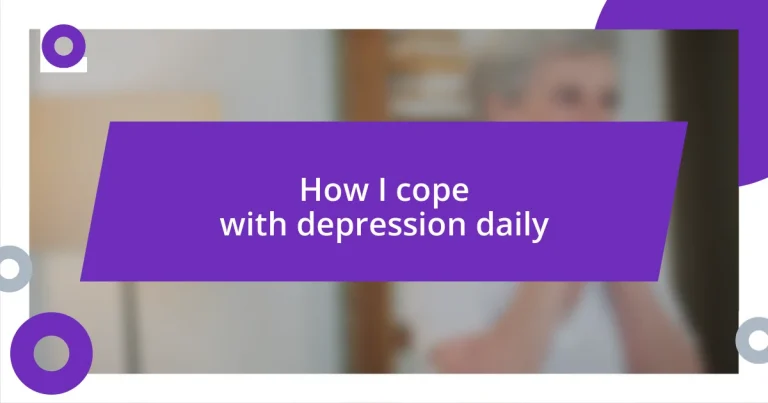Key takeaways:
- Living with depression can make simple daily tasks feel overwhelming, highlighting the importance of self-compassion and understanding individual struggles.
- Establishing a flexible daily routine and incorporating self-care strategies, such as creative outlets and mindfulness practices, can significantly improve emotional well-being.
- Seeking support from others, whether through personal connections or online communities, is crucial for navigating the challenges of depression and fostering a sense of belonging.
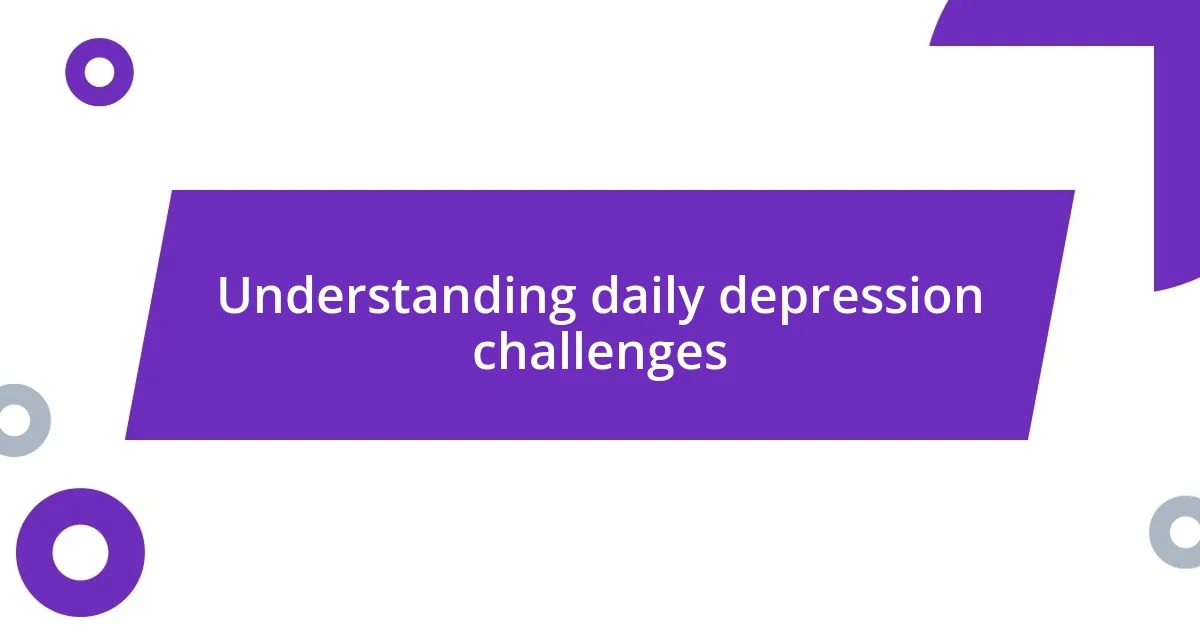
Understanding daily depression challenges
Living with daily depression presents a unique set of challenges that often go unnoticed by others. I recall a day when getting out of bed felt like climbing a mountain. It’s frustrating, isn’t it? The simplest tasks, like taking a shower or making breakfast, can feel insurmountable, amplifying the sense of isolation that often accompanies this condition.
One moment that stands out to me was when I stood in front of my closet, paralyzed by indecision. Choosing an outfit shouldn’t be hard, right? But when you’re grappling with depression, even this seemingly small decision can spark self-doubt and overwhelm. It’s a reminder that every day can bring its own test, and navigating these moments requires a kind of patience with ourselves that we often forget to extend.
It’s crucial to recognize that these daily struggles are not a reflection of our strength or worth. I find myself constantly asking, “Why can’t I just push through it like everyone else?” The truth is, each person’s battle is different. Acknowledging our unique experiences helps cultivate compassion, both for ourselves and for others who might be silently grappling with similar feelings.

Developing a daily routine
Finding a daily routine that suits my needs has been a game-changer in managing depression. I remember when I started incorporating small rituals into my mornings. Just the act of making a cup of tea and sitting quietly for a few moments grounded me, setting a calm tone for the day ahead. These little rituals aren’t just tasks; they’re reminders to check in with myself.
Over time, I’ve noticed that structure gives me a sense of purpose. By planning my day, even if it’s simply setting goals like going for a short walk or reading a chapter of a book, I felt more in control. There are days when I stray from my routine, and that’s okay! What’s important is that I acknowledge it and don’t dwell too much on the hiccups. After all, it’s a journey, not a race, right?
Another key aspect is flexibility within my routine. I allow space for spontaneity, as strict schedules can sometimes feel stifling. For instance, if I’m having a low day, I might swap out my exercise plan for a comforting movie instead. Listening to what I need that day, rather than rigidly sticking to a plan, helps me feel more at peace and less like I’m failing myself.
| Daily Routine Element | Purpose |
|---|---|
| Morning Rituals | Grounding and setting a positive tone |
| Daily Goals | Creating a sense of purpose |
| Flexibility | Adapting to emotional needs |

Effective self-care strategies
Self-care strategies play a pivotal role in navigating the challenges of depression. One method that has had a profound effect on me is engaging in creative outlets. I vividly remember when I picked up painting again after years. The feeling of mixing colors and letting my emotions flow onto the canvas became an unexpected source of healing. It’s a fantastic way to express feelings that are often hard to articulate. For those who may not see themselves as artists, I firmly believe that the act of creating—be it through writing, cooking, or even gardening—offers a therapeutic escape and fosters a deeper connection to oneself.
As I explored different strategies, I discovered some effective practices that could support emotional well-being daily. Here are a few that have genuinely helped me:
- Mindfulness Exercises: Engaging in meditation or simply focusing on my breath helped ground me during overwhelming moments.
- Physical Activity: Even a short walk around the neighborhood brings a sense of accomplishment and boosts my mood.
- Journaling: Writing down my thoughts and feelings allows me to process emotions and recognize patterns in my triggers.
- Connecting with Nature: Spending time outdoors, whether it’s a park or my backyard, reminds me of the beauty around, lifting my spirits.
- Reaching Out: A quick message or call to a friend provides support and reminds me I’m not alone in this journey.
While these strategies might seem simple, they hold potent potential when integrated into my daily life.
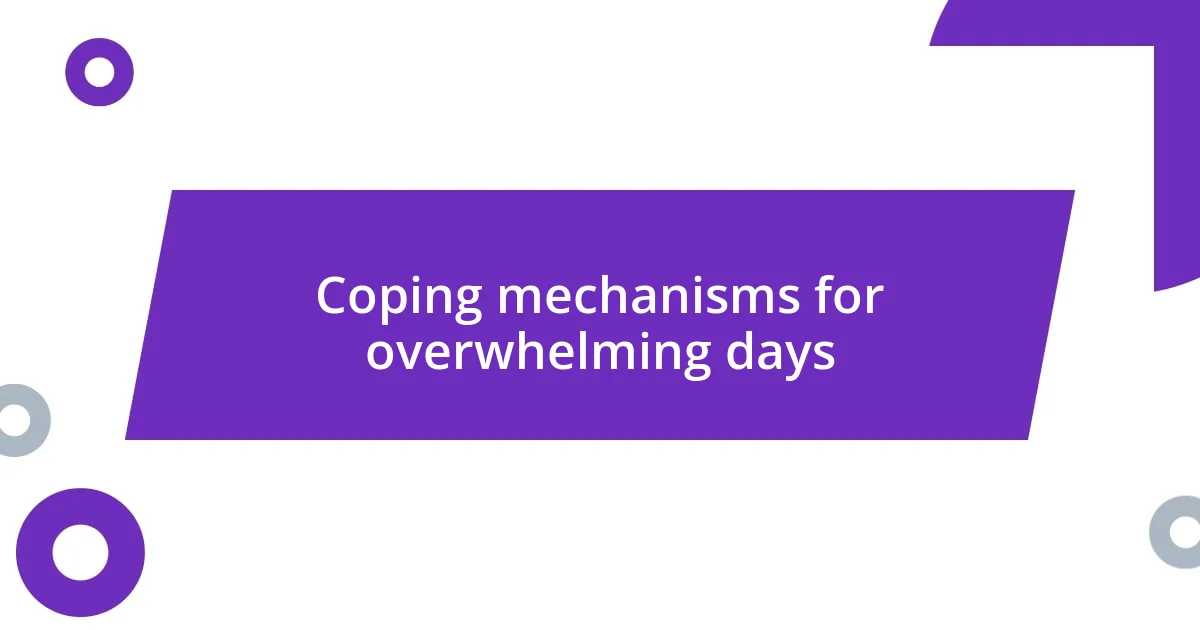
Coping mechanisms for overwhelming days
On particularly overwhelming days, I often find myself seeking solace in nature. One of my favorite coping mechanisms is stepping outside for a few moments, letting the fresh air and sounds of chirping birds remind me that the world is still full of life. Can you recall the feeling of grass between your toes or the warmth of sunlight on your skin? Those simple moments can really anchor me back to the present, almost like a gentle nudge to breathe and let go of the weight on my shoulders.
Another strategy that works wonders is creating a ‘comfort kit,’ filled with items that bring me joy and stability. It might include my favorite book, a cozy blanket, or even a playlist of uplifting songs. I’ve had days when just picking up that book instantly transported me to another world, where my worries felt lighter. What do you think you would put in your comfort kit? Personalizing this little toolkit can make a huge difference when those overwhelming feelings creep in.
Finally, I’ve found that reaching out for support is a powerful coping mechanism. I remember a day when I was feeling particularly heavy-hearted, and I simply texted a friend to share what I was going through. The relief that washed over me as she responded with understanding and encouragement was incredible. It made me realize that we often underestimate the power of connection. How often do we resist reaching out when it can be such a comfort? Sharing our struggles, even in small doses, can foster a sense of belonging that is crucial during tougher times.

Seeking support from others
One of the most impactful lessons I’ve learned in my journey with depression is the importance of seeking support from others. I recall a deeply isolating day when everything felt heavy, and I finally reached out to a colleague I trusted. Just hearing their voice and knowing someone understood my struggles helped lift the fog, reminding me that I wasn’t facing this alone. Have you ever felt that weight begin to lift simply by sharing your feelings?
I also make it a point to engage in group activities, whether it’s a book club or a fitness class. The energy of being surrounded by others, even when I may not feel like talking, can be incredibly revitalizing. During one particularly tough week, I joined a yoga class, and the collective spirit of everyone working through their practice filled me with an unexpected sense of community. I realized then that these experiences not only keep me accountable but also create moments of connection, even in silence. Can you think of a group or community that makes you feel supported?
When my mood dips, I often turn to digital support networks as well. I remember joining an online forum where individuals share their experiences with mental health. The first time I read someone articulate feelings I thought only I understood, it was like finding a lifeline in a vast sea of confusion. Together, we navigate the complexities of our experiences and offer encouragement to one another. This virtual support has taught me that no matter where we are, connection is always within reach. Have you ever explored online communities for support? I truly believe they can make a significant difference in helping us cope.
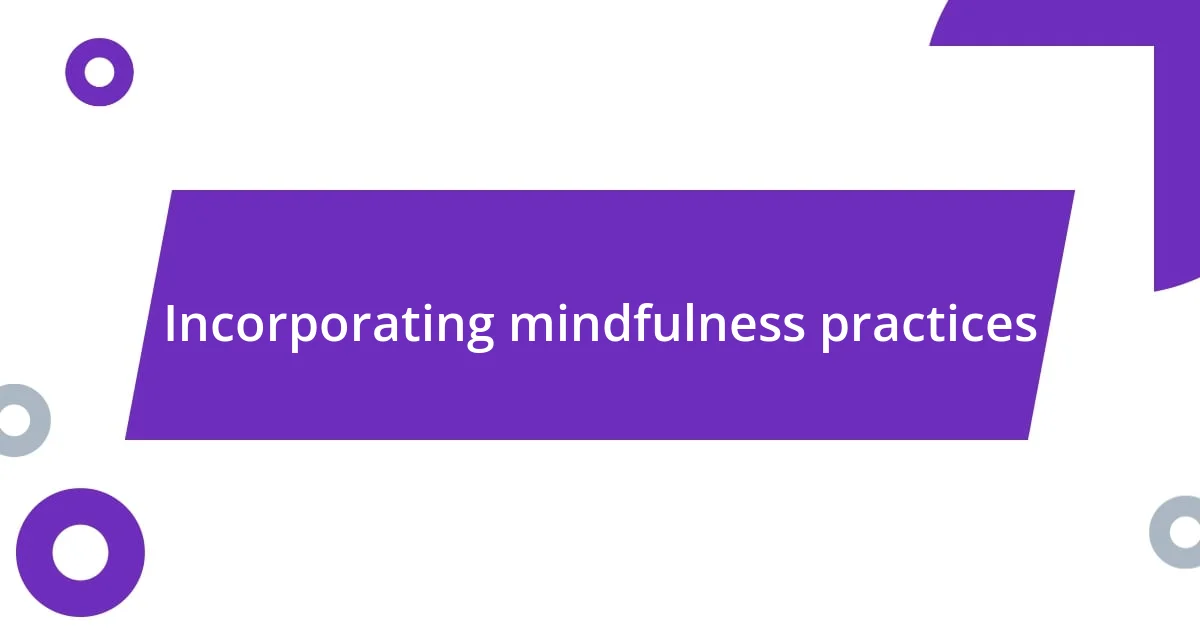
Incorporating mindfulness practices
Incorporating mindfulness practices into my daily routine has become a lifeline amidst the ebb and flow of my depression. I remember a day when I felt a whirlwind of emotions crashing over me, so I decided to pause and practice mindful breathing. Focusing on each inhale and exhale not only grounded me but also transformed my chaotic thoughts into ripples of calm. Have you ever noticed how just a few minutes of deep, intentional breathing can change your entire mood?
Guided meditations are another tool I often lean on. One evening, after struggling to unwind, I turned on a meditation app and followed a session focused on self-compassion. As the gentle voice encouraged me to embrace my feelings without judgment, I felt my heart soften. It struck me how often we can be our worst critics. How do you treat yourself during difficult times? Being kinder to myself through mindfulness has allowed me to find a sanctuary in my own mind, where acceptance blossoms even in the shadows.
Additionally, I like to bring mindfulness into simple, everyday activities. One time, while washing the dishes, I focused solely on the warm water and the rhythm of my hands working through the bubbles. I realized how easy it is to overlook these small moments when we’re lost in our thoughts. Have you tried to engage with the present in your daily tasks? By turning mundane actions into mindful practices, I’ve discovered a way to invite peace into the whirlwind of my day-to-day life.
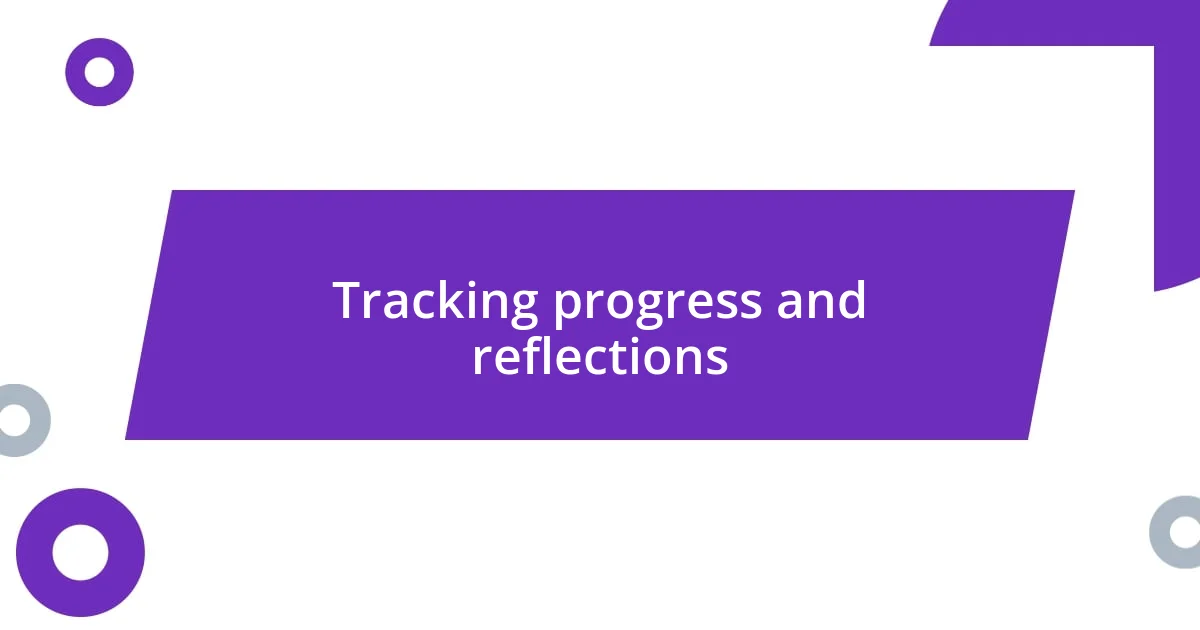
Tracking progress and reflections
Tracking my progress is like charting an unpredictable course through a stormy sea. Each morning, I jot down a few thoughts in my journal, noting the highs and lows of the previous day. There was one time when I realized that even on the toughest days, I managed to find a moment of gratitude—like savoring my favorite cup of tea. It struck me: what small victories have you noticed in your own journey? Recognizing these moments helps me see my resilience, even when depression clouds my view.
Reflection plays a crucial role in shaping my understanding of this experience. On days when I feel overwhelmed, I turn back to my entries and reflect on how I coped with similar feelings in the past. I distinctly recall reading an entry from a particularly tough week and recognizing that I had faced those feelings before and emerged stronger. Have you ever revisited your own experiences to find strength in your progress? It reminds me that my journey, despite its ups and downs, is a testament to growth.
Additionally, I’ve started incorporating monthly reviews into my routine. At the end of each month, I take some quiet time to assess how I felt overall and what strategies worked best. Once, I noted that keeping a sleep schedule drastically improved my mood. It was a revelation! What strategies have you discovered that uplift you? These reflections not only guide my future choices but also reinforce a sense of accountability, making the path smoother and less isolating as I continue my daily battle with depression.












